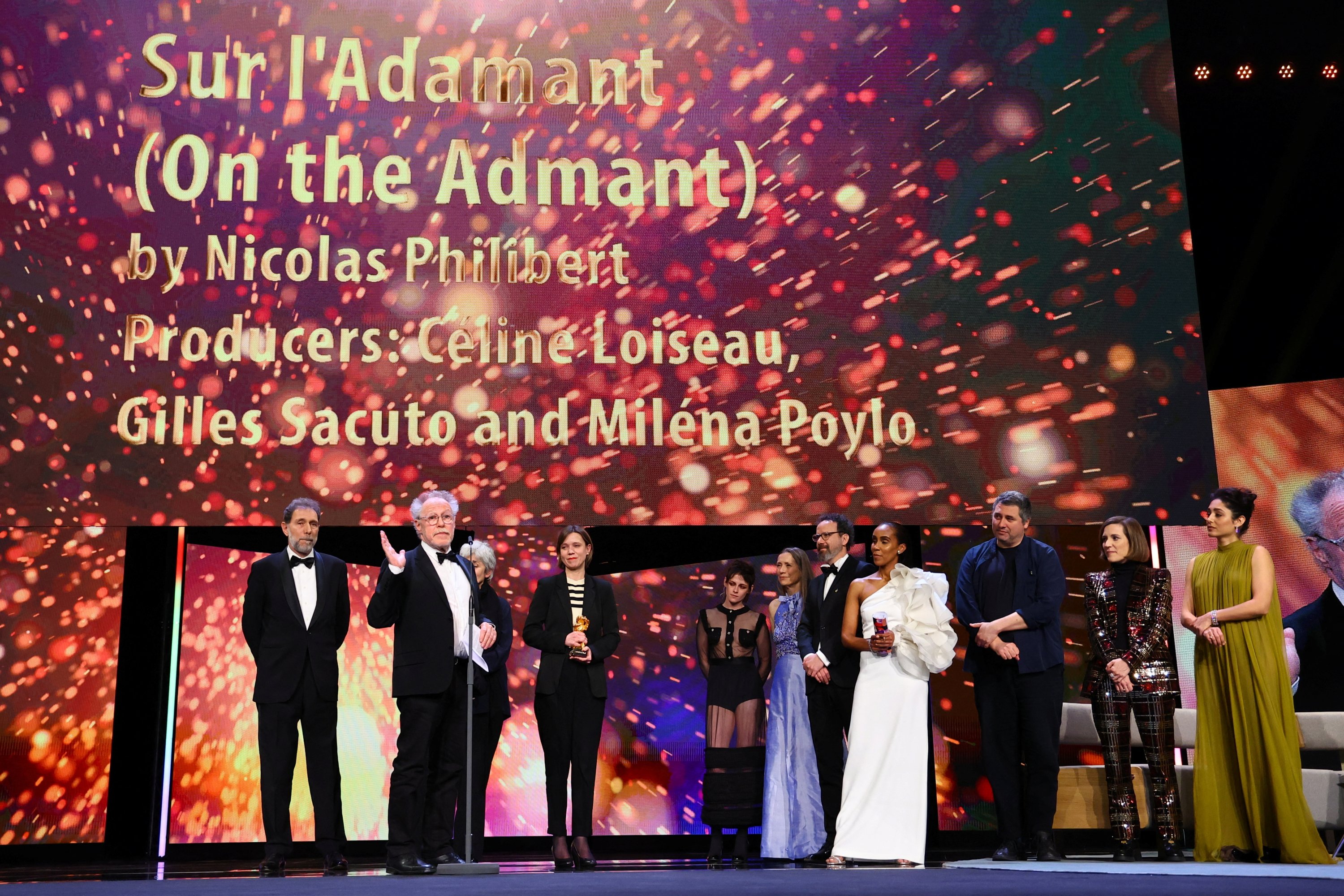© Turkuvaz Haberleşme ve Yayıncılık 2024
The Golden Bear award for best picture was given to the documentary "Sur l'Adamant" ("On the Adamant"), directed by Nicolas Philibert, at the Berlin Film Festival on Saturday.
"On the Adamant," coming more than 20 years after Philibert's acclaimed education documentary "To Be and To Have," is about a floating day care center for people with psychiatric problems on the Seine in Paris.
"This gentle, enlightening film invites us to join the welcoming microcosm of the Adamant," the festival wrote. "In their company, as one patient suggests, we may decide in the morning to ensure we will have a good day."
Thanking the jury, Philibert, 72, said, "That documentary can be considered a cinema in its own right touches me deeply."
"On the Adamant" offers an intimate glimpse into the lives of adults and their carers in the Parisian day-care center, which puts an accent on providing them a creative outlet.
Philibert said the film is "an attempt to overturn the image we have" of people with psychiatric problems.
"The cliches are deep-rooted. The film tries to unravel them (but) there is a long way to go."
The Hollywood Reporter praised the film's "warmth and enthusiasm," calling it "a portrait of several individuals who, despite their noticeable disabilities, can produce original and moving works of art."
French President Emmanuel Macron congratulated Philibert and his subjects on the win, calling the film a "story of humanity and commitment."
Documentaries are regularly selected in major international film competitions but rarely win awards.
Last year, the Venice Film Festival awarded its Golden Lion to a documentary about the opiate crisis in the United States by Laura Poitras ("All The Beauty and The Bloodshed").
Stewart, at 32, the youngest president in the festival's history, said the jury had been asking themselves all week, "what makes a movie a movie."
They had set aside "invisible parameters" in awarding the Golden Bear, she said, because "when you focus too much on what something is, you tend to lose track of what it does.
"This is a boundary-pushing festival, and so it offers us the opportunity to be expansive in how we define those things, how we value works of art, how we categorize them," she said.
This year's acting prize went to a child: Sofía Otero was awarded for best drama performance in a leading role. In the coming-of-age film "20 000 species de abejas" ("20,000 Species of Bees"), she plays an 8-year-old child in search of her identity.
Otero is the youngest award winner in the history of the Berlinale, according to the film festival, which jury chief Kristen Stewart described as a "boundary-pushing" event.
"I want to thank the jury for believing in me," Otero said on stage. "This prize is something extraordinary for me."
The young actress won the prize for her role in "20,000 Species of Bees," the feature debut from Spanish director Estibaliz Urresola Solaguren.
Critics have lavished praise on the film. Screen Daily predicted that "arthouse audiences worldwide should respond to the pathos, breadth, and humanity of a film that takes a while to build but, when it does, never loses its grip." Otero, who fought back the tears when collecting the award, later told journalists she was "very grateful, pleased."

There was more success for France as Philippe Garrel, 74, won the Silver Bear for best director for "The Plough," a drama about three siblings from a family of puppeteers coping with the death of their father.
Garrel dedicated the prize to his children and French-Swiss director Jean-Luc Godard, "a great master for many of us," who died last September.
The second prize went to "Afire" from German director Christian Petzold, about a group of friends whose holiday retreat to the Baltic coast goes wrong.
Variety called it "wincingly well-observed and acidly funny," while the Hollywood Reporter said it was "a deceptively simple and straightforward but emotionally layered film."
Coming in third was "Bad Living" by Portugal's Joao Canijo, about several female members of the same family who run a shabby hotel and are also struggling with their relationships with one another.
After two years of a reduced format due to COVID-19 restrictions, the 11-day Berlinale got back in full swing this year, with A-listers such as Cate Blanchett, Helen Mirren and Steven Spielberg walking the red carpet.
The festival, alongside Cannes and Venice as one of Europe's top cinema showcases, also marked the first anniversary of Russia's invasion of Ukraine and highlighted anti-government protests in Iran with new feature films and documentaries.
There were 19 films from around the world vying for this year's Golden Bear, which was awarded at a gala ceremony by a jury led by Stewart.
Another major award, the Silver Bear Grand Jury Prize, went the "Roter Himmel" ("Afire") – a relationship drama set at a holiday home on the Baltic coast – by German director Christian Petzold.
Austrian Thea Ehre received the Silver Bear for Best Supporting Performance. Ehre plays a transwoman in Christoph Hochhausler's crime thriller "Bis and Ende der Nacht" ("Until the End of the Night"), who goes undercover with a policeman to investigate the drug milieu.
German filmmaker Angela Schanelec was awarded the Screenplay Prize for her Oedipus adaptation "Music."
Frenchman Philippe Garrel received the Silver Bear for Best Director; his film "Le grand chariot" ("The Plough") portrays a family of puppeteers.
The Jury Prize went to Portuguese director João Canijo's psychodrama "Mal Viver" ("Bad Living"), which tells the story of several women in an old hotel.
Cinematographer Helene Louvart received the Silver Bear for Outstanding Artistic Contribution in the drama "Disco Boy." In it, Franz Rogowski plays a man who flees to France and joins the Foreign Legion.
Along with Cannes and Venice, the Berlinale is one of the world's major film festivals. The film festival in Berlin took place for the 73rd time this year.
